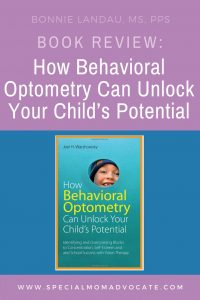 When a child struggles in school, parents often go looking for a reason. Is the child trying hard enough? Does my child have a learning disability? Is the teacher not effective? I was this kind of parent, looking for answers — and possibly labels — that would lead to a solution.
When a child struggles in school, parents often go looking for a reason. Is the child trying hard enough? Does my child have a learning disability? Is the teacher not effective? I was this kind of parent, looking for answers — and possibly labels — that would lead to a solution.
Despite many experts along the way, and an IEP team, it wasn’t until we tried Easyread that a major part of the problem was finally revealed — my son has significant eye-tracking difficulties. And being a parent who wants to understand as much as possible about his challenges, I did some research and discovered this fabulous book, How Behavioral Optometry Can Unlock Your Child’s Potential: Identifying and Overcoming Blocks to Concentration, Self-Esteem and School Success with Vision Therapy by behavioral optometrist, Dr. Joel H. Warshowsky.
I read the book hoping to understand how to help my son through vision therapy, but what I got from the book was so much more. In a very detailed series of stories and professional knowledge, Dr. Warshowsky impresses upon the reader how drastically a vision problem effects all areas of life function. He not only talks about the challenges in school and in sports, but how the child’s self esteem suffers because they really are trying the best they possibly can. It even affects how the child perceives space and how he/she fits into the physical work around them.
 In a succinct manner, and in layman’s terms, Dr. Warshowsky does an excellent job of explaining how vision works and why a 20/20 diagnosis does not rule out a functional vision problem. He further explains the various behavioral vision difficulties a child may have, and how those difficulties show up in particular patterns of symptoms. He candidly shares the heartfelt stories of children who got proper help, and he also shares the detached sense of self a child will have if their vision issues are never resolved.
In a succinct manner, and in layman’s terms, Dr. Warshowsky does an excellent job of explaining how vision works and why a 20/20 diagnosis does not rule out a functional vision problem. He further explains the various behavioral vision difficulties a child may have, and how those difficulties show up in particular patterns of symptoms. He candidly shares the heartfelt stories of children who got proper help, and he also shares the detached sense of self a child will have if their vision issues are never resolved.
If your child struggles in school, I would highly recommend you read this book, even if you don’t think he or she has a vision problem. If the content resonates with your child’s difficulties, it’s an easy thing to rule in/out vision problems with a visit to a behavioral optometrist. It’s a hard thing to leave these issues undiagnosed because your child’s entire life will be turned upside down as a result.
Dr. Warshowsky does a great job of helping the reader understand how critical functional vision is to success, and I do believe this book can help many parents find the solution they are seeking. You can find out more about him on his website: www.drjoelwarshowsky.com
ABOUT THE AUTHOR:
Bonnie Landau is a professional counselor and holistic therapist in Ventura County, California. Her specialities include therapy for autism, therapy for ADHD, and therapy for parenting who have kids with autism or ADHD or other neurodivergence. She changed careers from graphic design to counseling with the goal of helping struggling parents of kids with ADHD, autism, or other neurodivergence find strategies and solutions to help their children succeed. Bonnie is also the author of Special Ed Mom Survival Guide: How to Prevail in the Special Education Process and Find Life-long Strategies for You and Your Child.


